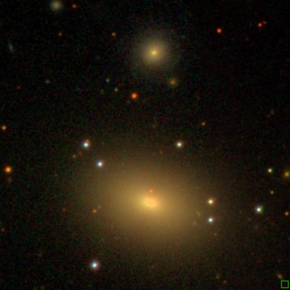| NGC 499 | |
|---|---|
 | |
| Observation data ( J2000 [1] epoch) | |
| Constellation | Pisces [2] |
| Right ascension | 01h 23m 11.5s [3] |
| Declination | +33° 27′ 28″ [3] |
| Redshift | +0.014691 ± 0.000117 [1] |
| Heliocentric radial velocity | (4372 ± 35.2) km/s [1] |
| Distance | 197 Mly [4] |
| Apparent magnitude (V) | 12.2 [2] |
| Characteristics | |
| Type | E-S0 [2] |
| Apparent size (V) | 1.7' × 1.3' [2] |
| Other designations | |
| PGC 5060, IC 1686, UGC 926, GC 289, MCG 5-4-38, 2MASS J01231145+3327362, H 3.158, h 106, CGCG 502-059 [2] [1] [5] | |
NGC 499, also occasionally referred to as PGC 5060, IC 1686 or GC 289, is a lenticular galaxy in the constellation Pisces. [2] It is located approximately 197 million light-years from the Solar System [4] and was discovered on 12 September, 1784 by astronomer William Herschel. [5]
The NGC 499 Group is named after the galaxy. [3]
The object was discovered by Herschel along with NGC 495 and NGC 496. He initially described the discovery as "Three [NGC 499 along with NGC 495 and 496], eS and F, forming a triangle.". As he observed the trio again the next night, he was able to make out more detail: "Three, forming a [right triangle]; the [right angle] to the south NGC 499, the short leg preceding [NGC 496], the long towards the north [NGC 495]. Those in the legs [NGC 496 and 495] the faintest imaginable; that at the rectangle [NGC 499] a deal larger and brighter, but still very faint." [6]
NGC 499 was later also observed by William Herschel's son John Herschel [5] and independently found by Stéphane Javelle in 1899. [6]
- ^ a b c d "NGC 499". SIMBAD. Centre de données astronomiques de Strasbourg. Retrieved 2017-11-07.
- ^ a b c d e f "Revised NGC Data for NGC 499". spider.seds.org. Retrieved 2017-10-05.
- ^ a b c "Your NED Search Results". ned.ipac.caltech.edu. Retrieved 2017-11-07.
- ^ a b An object's distance from Earth can be determined using Hubble's law: v=Ho is Hubble's constant (70±5 (km/s)/Mpc). The relative uncertainty Δd/d divided by the distance is equal to the sum of the relative uncertainties of the velocity and v=Ho
- ^ a b c "New General Catalog Objects: NGC 450 - 499". cseligman.com. Retrieved 2017-11-07.
- ^ a b "astronomy-mall.com/Adventures.In.Deep.Space/NGC%201-7840%20complete.htm". Astronomy Mall. Retrieved 2017-11-07.
- NGC 499 on WikiSky: DSS2, SDSS, GALEX, IRAS, Hydrogen α, X-Ray, Astrophoto, Sky Map, Articles and images
- SEDS
| NGC 499 | |
|---|---|
 | |
| Observation data ( J2000 [1] epoch) | |
| Constellation | Pisces [2] |
| Right ascension | 01h 23m 11.5s [3] |
| Declination | +33° 27′ 28″ [3] |
| Redshift | +0.014691 ± 0.000117 [1] |
| Heliocentric radial velocity | (4372 ± 35.2) km/s [1] |
| Distance | 197 Mly [4] |
| Apparent magnitude (V) | 12.2 [2] |
| Characteristics | |
| Type | E-S0 [2] |
| Apparent size (V) | 1.7' × 1.3' [2] |
| Other designations | |
| PGC 5060, IC 1686, UGC 926, GC 289, MCG 5-4-38, 2MASS J01231145+3327362, H 3.158, h 106, CGCG 502-059 [2] [1] [5] | |
NGC 499, also occasionally referred to as PGC 5060, IC 1686 or GC 289, is a lenticular galaxy in the constellation Pisces. [2] It is located approximately 197 million light-years from the Solar System [4] and was discovered on 12 September, 1784 by astronomer William Herschel. [5]
The NGC 499 Group is named after the galaxy. [3]
The object was discovered by Herschel along with NGC 495 and NGC 496. He initially described the discovery as "Three [NGC 499 along with NGC 495 and 496], eS and F, forming a triangle.". As he observed the trio again the next night, he was able to make out more detail: "Three, forming a [right triangle]; the [right angle] to the south NGC 499, the short leg preceding [NGC 496], the long towards the north [NGC 495]. Those in the legs [NGC 496 and 495] the faintest imaginable; that at the rectangle [NGC 499] a deal larger and brighter, but still very faint." [6]
NGC 499 was later also observed by William Herschel's son John Herschel [5] and independently found by Stéphane Javelle in 1899. [6]
- ^ a b c d "NGC 499". SIMBAD. Centre de données astronomiques de Strasbourg. Retrieved 2017-11-07.
- ^ a b c d e f "Revised NGC Data for NGC 499". spider.seds.org. Retrieved 2017-10-05.
- ^ a b c "Your NED Search Results". ned.ipac.caltech.edu. Retrieved 2017-11-07.
- ^ a b An object's distance from Earth can be determined using Hubble's law: v=Ho is Hubble's constant (70±5 (km/s)/Mpc). The relative uncertainty Δd/d divided by the distance is equal to the sum of the relative uncertainties of the velocity and v=Ho
- ^ a b c "New General Catalog Objects: NGC 450 - 499". cseligman.com. Retrieved 2017-11-07.
- ^ a b "astronomy-mall.com/Adventures.In.Deep.Space/NGC%201-7840%20complete.htm". Astronomy Mall. Retrieved 2017-11-07.
- NGC 499 on WikiSky: DSS2, SDSS, GALEX, IRAS, Hydrogen α, X-Ray, Astrophoto, Sky Map, Articles and images
- SEDS